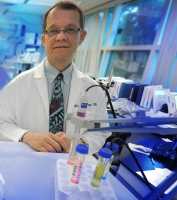
22 Feb Study Suggests Some Biologic Basis for Gender Identity
MedicalResearch.com Interview with:

DR. LAWRENCE C. LAYMAN
CREDIT: PHIL JONES, SENIOR PHOTOGRAPHER
AUGUSTA UNIVERSITY
Lawrence C. Layman, M.D.
Robert B. Greenblatt, M.D., Distinguished Chair in Endocrinology
Professor & Chief
Section of Reproductive Endocrinology, Infertility, & Genetics
Department of Obstetrics & Gynecology
Director, REI Fellowship Program
Co-Director, MD/PhD Program
Department of Neuroscience & Regenerative Medicine
Department of Physiology
Medical College of Georgia at Augusta University
MedicalResearch.com: What is the background for this study?
Response: I have taken care of many transgender patients over the past 20 years. We think there is a biological basis for transgender identity rather than choice.
Animal models suggest that exposure to estrogen or testosterone at a critical time during development will render an animal of either sex to behave as male with aggressive behavior and they will mount females. If this pathway is blocked, then the end result is more receptive, female sexual behavior. We thought that variants in genes involved in metabolizing these hormones in the brain could play some role in transgender identity. Because the cost of sequencing all genes was similar to the cost of looking for changes in just these genes, we performed whole exome sequencing (sequencing the protein coding regions of genes) on about 30 transgender patients.
MedicalResearch.com: What are the main findings?
Response: We found some variants in genes by whole exome sequencing that we confirmed by Sanger sequencing (a confirmatory method). These variants occur in genes that appear to have important functions in areas of the brain that may be involved to masculinize or feminize the brain.
MedicalResearch.com: What should readers take away from your report?
Response: These findings are just preliminary; we need to study the effects of these genetic variants in the laboratory setting and do DNA sequencing on many more patients before we can say they play an important role in gender identity.
MedicalResearch.com: What recommendations do you have for future research as a result of this work?
Response: We have to collect larger numbers of transgender patients, both male to female and female to male. We will need family members, laboratory confirmation, and study the effects in an animal model.
MedicalResearch.com: Is there anything else you would like to add?
Response: These studies suggest that there could be some biological basis to transgender identity, but these findings should be regarded as very preliminary.
Citation:
Theisen, Viji Sundaram, Mary S. Filchak, Lynn P. Chorich, Megan E. Sullivan, James Knight, Hyung-Goo Kim, Lawrence C. Layman. The Use of Whole Exome Sequencing in a Cohort of Transgender Individuals to Identify Rare Genetic Variants. Scientific Reports, 2019; 9 (1) DOI: 10.1038/s41598-019-53500-y
[subscribe]
[last-modified]
The information on MedicalResearch.com is provided for educational purposes only, and is in no way intended to diagnose, cure, or treat any medical or other condition. Always seek the advice of your physician or other qualified health and ask your doctor any questions you may have regarding a medical condition. In addition to all other limitations and disclaimers in this agreement, service provider and its third party providers disclaim any liability or loss in connection with the content provided on this website.
Last Updated on February 22, 2020 by Marie Benz MD FAAD
